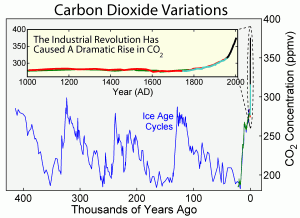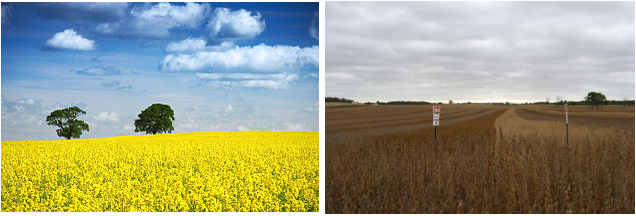Ecology versus biodiesel
Nowadays, one of the biggest misunderstanding in the ecology is the concept of biofuels.  Everyone must agree that the level of carbon dioxide in the last 200 hundred years increased and this fact started with the industrial revolution and proceeds until today (see plot on the right). Most scientists connect this with the massive usage of fossil fuels by human. Therefore, the governments try to reduce carbon dioxide emission by many different means. For example, they try to encourage people to use biofuels e.g. biodiesel (by lowering the taxes for biofuels, public campaigns etc.). The concept is very simple, we do not use fossil fuels which increase the level of carbon dioxide. Lets use fuels produced from plants (rapeseed and soybean oils are the most commonly used). As the plants absorb carbon dioxide from the air, if converted into fuels, they will not increase the carbon dioxide level at all. Great idea. … No, currently it is very bad idea to use biodiesel, if you care about the environment.
Everyone must agree that the level of carbon dioxide in the last 200 hundred years increased and this fact started with the industrial revolution and proceeds until today (see plot on the right). Most scientists connect this with the massive usage of fossil fuels by human. Therefore, the governments try to reduce carbon dioxide emission by many different means. For example, they try to encourage people to use biofuels e.g. biodiesel (by lowering the taxes for biofuels, public campaigns etc.). The concept is very simple, we do not use fossil fuels which increase the level of carbon dioxide. Lets use fuels produced from plants (rapeseed and soybean oils are the most commonly used). As the plants absorb carbon dioxide from the air, if converted into fuels, they will not increase the carbon dioxide level at all. Great idea. … No, currently it is very bad idea to use biodiesel, if you care about the environment.
If you will think about the problem for a bit longer moment and you did not sleep during biology lessons in primary school, you should end with the conclusion that biofuels from rapeseed, soybean, palm oils are really not so great. How come, you will say?
- If you want to produce biofuels you need to have a lot of new fields for plants. You want to produce big amounts of biofuels , so you need new fields (the currently existing ones are occupied by different plants used in conventional agriculture for feeding animals and humans). Moreover, if you compare the efficiency of the production of biofuels from plants, it is obvious that you need to cultivate the oil plants on huge areas to substitute fossils.
Ok, but where is the catch? From the ecology lessons everyone knows that the nature optimized the ecosystems in such a way that they are complex and very efficient. This means that no matter where it be, the wild, natural ecosystem will always be more efficient in capturing carbon dioxide than plant monoculture made by human. Moreover, to cultivate fields you need to use herbicides, fertilizers and a lot of human or would I say machanic work. This means that you need to use a lot of energy to produce oils for biofuels. But going back to getting new areas for fields. In most countries, especially in tropical regions, the new corn fields and palm plantations are replacing natural ecosystems, in extreme case the rain forests (it is common in Brazil and Malaysia, top leading producers of biofuels). It is obvious that the rain forest is able to accumalate a lot of the carbon dioxide (it is the most complex ecosystem we know, in the simplest way you can visualize it as a green wall up to 40 m in high). There is no sense to compare this amount with the savings we get when we replace the rain forest by palm plantation for production of biodiesel.
- Although, oil crops agricultural areas can be very picturesque (see fotos on the bottom), from the ecological point of view they are closer to deserts and it is highly probable that in the next few decades they enlarge degraded lands.
At the end, we must admit that there is a glimmer of hope in this story. The next generation of biofuels (a lot of research are being done now in this field) will be produced from waste biomass or from algae.
To conclude, if you think that by using biodiesel you are “ecological”, think twice. Actually, all available biofuels on market can be categorized as the first generation of biofuels and they have little to do with real ecology.
Futher reading
- Hill J, Nelson E, Tilman D, Polasky S, Tiffany D. Environmental, economic, and energetic costs and benefits of biodiesel and ethanol biofuels. PNAS 2006 103(30):11206-10.
- Nature 474, S1-S25, – Biofuels, special supplement
- Searchinger T. A quick fix to the food crisis. Curbing biofuels should halt price rises. Sci Am. 2011 Jul;305(1):14
style="display:inline-block;width:728px;height:90px"
data-ad-client="ca-pub-0264966750335509"
data-ad-slot="1748480464">
